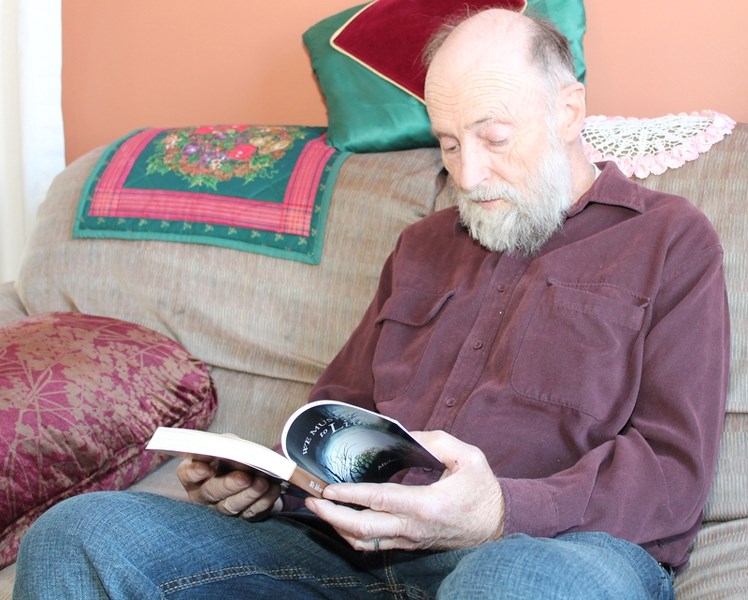Even as he reads the dedication at the beginning of his new novel, it's not hard to see deep memories and emotions swelling within Michael Parlee.
“This book is dedicated to all those who are struggling with the pain that the injustices of life have brought their way,” he read, struggling to hold back tears. “It is my hope that they, like the author, will find the peace, tranquility and wholeness that only the granting of forgiveness can bring.”
Parlee, who lives in Bowden with his wife Pauline, doesn't hide that while We Must Forgive to Live is a fictional work that unfolds among the tragic settings of Ukraine in the 1930s under Stalin or Nazi-occupied Poland, he has injected a great deal of his life into the book.
“So it's based on my experience, a lot of life experiences, examples of others who hold a grudge and will never forgive,” he said.
We Must Forgive to Live follows Roger, who as a young boy experiences the death of his baby sister from starvation and the execution of his father after stealing a bag of wheat against the backdrop of famine in Ukraine.
Roger and his mother later escape into Poland and, because of their Jewish blood, ultimately end up in a slave labour camp when the Second World War breaks out.
While he survives, his mother and grandfather do not and Roger is consumed by anger and hatred, refusing to forgive those who have brought him so much pain.
Eventually his mental health deteriorates until his marriage falls apart and he ends up in an institution for shock treatments.
When Roger is released, feelings of grief and hatred return until the spirit of his mother comes to him in a dream and tells him he must “forgive to live.”
Upon returning to his homeland, Roger does forgive those responsible for the tragedies he has experienced and Parlee said Roger does find the “freedom he so longed for.”
“What I'm trying to do is get across to the reader that if they have these hang-ups with hate and anger, there's no sense dwelling on them,” Parlee said, adding he has battled with the same emotions that consume Roger in his own life.
“Fortunately I've been able to overcome a lot of them. Otherwise I couldn't write.”
This is Parlee's third novel and like Tanya, his first book that told the story of a young Alberta couple trying to survive infidelity, a failed business venture and illness in the first half of the 20th century, We Must Forgive to Live continues a theme in his works of couples struggling with their relationships.
He said the reason for that continuing theme is simple.
“Because, I suppose, we experienced it ourselves.”
Aside from the failed relationships he has witnessed in his family, Parlee said his own marriage has experienced challenges.
He said he has seen his loved ones take the “hard line” of deciding not to forgive the person who has hurt them and then suffer under the “pain and anguish” of keeping their anger bottled up.
“Because when you don't forgive, you're hurting yourself. The other person doesn't even know about it half the time, but you're inflicting pain on yourself and until you can get that out of your system, it's going to be hard to function.”
Asked how he was able to forgive when he was deeply hurt in the past, Parlee said he has the ability to stay objective.
“I see the whole picture. I see that in a relationship, problems in a relationship, it takes two to tango. Sometimes three,” he said. “I found that by granting forgiveness to the person who had hurt me deeply, deeply, that I got relief. I could have stayed angry for the rest of my life but with that, would there be an end?”
Pauline said she gave Parlee permission to use elements of their relationship in his novels because she believed some good would come out of sharing their story.
“I realized that if even one person was helped by the telling of the story and figuring out how to deal with it, then that would be a great enough reward and it has helped many,” she said.
Unlike Tanya, which took 10 years to write, Parlee penned We Must Forgive to Live in roughly three years.
The process of writing the new novel, he said, was challenging, especially while researching the horrors of life in Ukraine under Stalin and reliving some of the pain he had dealt with earlier in his life.
Parlee said he was “emotionally distraught” while writing the book and wrote much of the novel in his bedroom to privately deal with the strong emotions the process brought out, adding he realized many issues from his past that he thought were resolved were still with him.
But it became clear, he said, that reliving some of the “horrors of his past” was the only way to get them out of his system.
“As I wrote it, I found therapy. It's no different from going to a psychologist or doing a journal. Because you pour your soul out.”
We Must Forgive to Live was published by AuthorHouse, a self-publishing service, after Christmas and Parlee said it is available on demand on the Internet or at bookstores such as Chapters.
He is now finishing a children's book entitled Grandpa's Magic Beard that Parlee expected to have ready for publishing in about two months.



